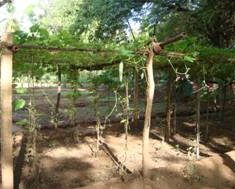Snake Gourd
Season and Field preparation
Soil
Sandy loam soils rich in organic matter with good drainage and the pH ranging from 6-5-7.5
Season
July and January are highly suitable for cultivation.
Seed treatment
Treat seeds with Trichoderma viride 4 g/kg or Pseudomonas fluorescens 10 g/kg or Carbendazim 2 g/kg of seeds before sowing.
Seed rate
1.5 kg of seeds/ha is required.
Preparation of field
Plough the field to fine tilth and dig pits of size 30 cm x 30 cm x 30 cm at 2.5 x 2 m spacing and form basins.
Sowing
Sow the seeds (5 seeds / pit) and thin the seedlings to two/pit after 15 days of sowing.
Irrigation
Irrigate the basin before dibbling the seeds and thereafter once a week.
Application of fertilizers
Apply 10 kg of FYM, 100 g of NPK 6:12:12 mixture as basal dose per pit and N @ 10 g pit 30 days after sowing. Apply Azospirillum and Phosphobacteria @ 2 kg/ha and Pseudomonas 2.5 kg/ha along with FYM 50 kg and neem cake @ 100 kg before last ploughing.
After cultivation
Hoeing and weeding can be done thrice or as and when necessary. Provide stakes and train the plants to reach the pandal height (2 m). Pandal is not essential for Co 2 variety. Spray Ethrel 100 ppm (1 ml in 10 lit of water) four times from 10 to 15 days after sowing at weekly intervals.

Snake gourd grown in pandal system
Quality seedling production
Nursery raising
Sow the snake gourd seeds in protrays containing well decomposed cocopeat medium. Sow only one seed per cell. Keep the trays under shadenet house. Water regularly with the help of rose can. Transplant about 12 days old seedlings to main field.
Planting
Spread the lateral tubes on the raised beds of 120cm wide at 150cm spacing. Irrigate the beds by operating the drip system continuously for 8-12 hrs. Plant the seedlings in the holes made at 60cm spacing.
Fertigation
Apply a dose of 75:100:100 kg NPK/ha throughout the cropping period through split application. Apply 75% of the phosphorus as superphosphate as basal dose.
Plant protection
Spray Dichlorvos 76% EC 6.5 ml/10 lit or Trichlorofon 50% EC 1.0 ml/l.
Fruit fly
